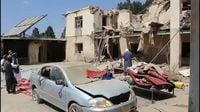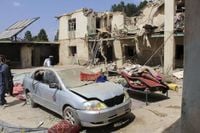On the night of August 28, 2025, a series of airstrikes rocked eastern Afghanistan, leaving a trail of devastation through the provinces of Nangarhar and Khost. The strikes, which killed at least three people and wounded seven others, have become the latest flashpoint in the already fraught relationship between Afghanistan and its neighbor, Pakistan. According to officials and witnesses cited by the Associated Press and other major outlets, homes were damaged and families left sifting through rubble in the aftermath.
The Taliban government in Kabul wasted no time in pointing the finger at Pakistan, blaming its military for what they described as a deliberate and provocative act. The Afghan Foreign Ministry condemned the strikes in the strongest terms, labeling them a "provocative act" and summoning Pakistan's ambassador to answer for the events. In a statement posted on X (formerly Twitter), Afghanistan’s Defense Ministry added, “Such barbaric and brutal actions benefit neither side, but deepen divisions between two Muslim nations and fuel hatred. These irresponsible activities will have consequences.”
For many residents of the affected areas, the night brought terror and tragedy. In Nangarhar’s Shinwari district, one family’s home was reduced to rubble. Shah Sawar, a resident of Shinwari, recounted his harrowing experience: “They dropped the first big bomb on my house. My house was completely destroyed. First I pulled a child out of the rubble, then I pulled four children and a woman out.” His words, reported by AP, underscore the human cost of these cross-border tensions.
Nangarhar’s deputy governor, Maulvi Azizullah Mustafa, claimed that the strikes were carried out by Pakistani drones. This accusation aligns with Kabul’s official stance, though it should be noted that neither the Pakistani government nor its military has commented publicly on the incident. The lack of response from Islamabad has only fueled Afghan suspicions and deepened the diplomatic rift.
These airstrikes are not an isolated event. In December 2024, Kabul accused Pakistan of launching similar attacks against suspected hideouts of the Pakistani Taliban in Afghanistan’s Paktika province. At that time, Pakistan also declined to acknowledge the strikes, and Kabul claimed it retaliated by targeting several points inside Pakistan. The cycle of accusation and denial has become a grim pattern in the region’s recent history.
The context for these latest airstrikes is complex and rooted in years of mutual distrust. Since the Taliban’s return to power in Afghanistan in 2021, relations between Kabul and Islamabad have remained tense. One of the main sticking points is the presence of the Pakistani Taliban—also known as Tehrik-i-Taliban Pakistan (TTP)—within Afghanistan. Pakistan accuses its neighbor of harboring members of this group, which is banned in Pakistan and blamed for some of the country’s deadliest terrorist attacks. Kabul, for its part, denies these allegations, insisting it does not allow anyone to use its soil against another country.
Despite these denials, Pakistan’s concerns have only grown as the TTP has stepped up attacks on security forces and civilians within Pakistan in recent years. The group, while separate from the Afghan Taliban, is closely allied with them—a fact that further complicates the already tangled web of regional politics and security.
Ironically, the latest violence comes just a week after top diplomats from Pakistan, China, and Afghanistan met in Kabul and pledged closer cooperation in the fight against terrorism. The meeting was intended to mark a new chapter in regional diplomacy, with all sides expressing hope for improved relations and joint efforts to combat extremist groups. Just three months ago, Pakistan and Afghanistan had even upgraded their diplomatic ties, signaling a tentative willingness to move past old grievances.
Yet, as the events of August 28 demonstrate, the underlying mistrust between Kabul and Islamabad remains as potent as ever. The Afghan government’s swift condemnation and the summoning of Pakistan’s ambassador highlight just how quickly diplomatic progress can unravel in the face of violence. As the AP and other sources report, the Afghan Defense Ministry’s warning about the consequences of such actions is not an empty threat; it reflects real fears that each new incident could trigger further escalation.
For ordinary Afghans, these geopolitical disputes have very real and immediate consequences. The destruction in Nangarhar’s Shinwari district is a stark reminder of how quickly lives can be upended. Families like that of Shah Sawar now face the daunting task of rebuilding in the shadow of uncertainty, their futures clouded by forces far beyond their control.
The broader context of Afghan-Pakistani relations is shaped by decades of suspicion, shifting alliances, and proxy conflicts. Since the Soviet invasion of Afghanistan in 1979, Pakistan has played a pivotal—if sometimes controversial—role in its neighbor’s affairs. In recent years, the rise of the TTP and the Taliban’s return to power have only heightened Islamabad’s anxieties, leading to periodic cross-border military actions and sharp diplomatic exchanges.
Observers note that while both countries share a long border and deep cultural ties, their relationship is perennially complicated by security concerns and competing interests. The presence of militant groups operating across the border, combined with the legacy of past conflicts, means that even small incidents can quickly spiral into larger crises.
International actors, including China, have sought to mediate and encourage cooperation, but progress has been slow and uneven. The recent trilateral meeting in Kabul was hailed as a step forward, yet the airstrikes just days later have cast a shadow over those efforts. As one seasoned diplomat put it, “Every time we take a step toward peace, something pulls us two steps back.”
Meanwhile, the silence from Islamabad following the latest accusations has drawn criticism from Afghan officials and left many questions unanswered. Without a clear response or acknowledgment from Pakistan, it is difficult to see how the two sides can move beyond the current impasse.
What remains clear is that the people of eastern Afghanistan are once again caught in the crossfire of a conflict that shows little sign of abating. Their stories—of loss, resilience, and hope—serve as a poignant reminder that behind every headline are lives forever changed by the decisions of distant leaders.
As the dust settles in Nangarhar and Khost, the challenge for both Afghanistan and Pakistan will be to find a way forward that prioritizes dialogue over violence, and cooperation over confrontation. Whether they can seize that opportunity remains to be seen, but the stakes—for both nations and for the region as a whole—could hardly be higher.






